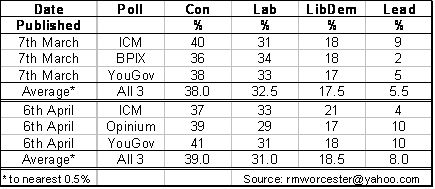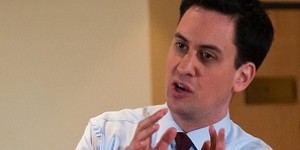 Sir Robert Worcester is a Visiting Professor of Government at LSE and an Honorary Fellow. He founded MORI in 1969.
Sir Robert Worcester is a Visiting Professor of Government at LSE and an Honorary Fellow. He founded MORI in 1969.
At the beginning of March, Sunday, the 7th, there were three polls published, ICM in the News of the World, BPIX in the Mail on Sunday, and YouGov in the Sunday Times. There was no statistically significant difference between them. They all had the share of each party well within the so-called ‘margin of error’.
All three had the Conservatives at 38 per cent, plus or minus two percent. All three had the Labour Party at 33.5 per cent, plus or minus one and one half percent. All three had the Liberal Democrats at 18%, plus or minus one percent. All were well within recognised statistical limits of sampling tolerance.
Yet the media including the BBC, without exception, misreported them then, because of their reporting the lead and not the share for each party.
Now, as the election begins, they do it again. The Political Editor of the BBC, Nick Robinson, who should of all people know better, saying on the Today Programme, on the very day the election is called, “One (poll) said the Tories are running away with it; the other said Labour would win.”
Wrong.
First, polls taken in the week before the election was called certainly do not in any way forecast what will happen during a month of election campaigning. They are as I have said hundreds of times in and on the media, a “snapshot at a point in time, and that time is when they were taken, not a month hence”.
Second, pollsters take samples of the British electorate, and are subject to the laws of statistics, usually estimated, depending on sample size, to within plus or minus three percent.
The table shows just how important it is to report the shares, not just focus on the lead. When will the media take note of this simple, but very important fact? It is no longer the ‘phoney’ election, it’s the real thing.
A further thing this shows, is how, a month apart, the figures are so stable, the Tories up a single point, Labour down a point and a half, the LibDems up a point.









Hi Bob – hope you use your Twitter account during the campaign, I always enjoy your insights. Best wishes, Adrian
I just saw Sir Robert Worcester on the BBC. The media are going a bit mad over these polls, so it was wonderful to see somebody truly explaining the polls and chiding the media. Thanks 🙂